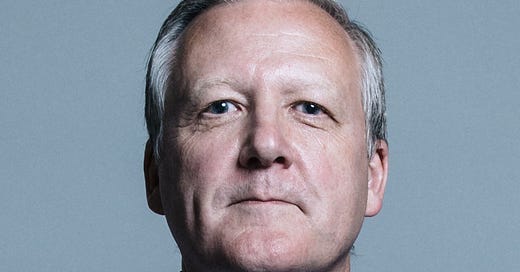Welcome! I’m Tom Griffin and this is my intelligence history newsletter. Feel free to share this article with the button below.
ISC Chair Lord Beamish (© House of Lords / photography by Roger Harris).
Could be the UK be about to lose legislative oversight of its intelligence agencies? That was the prospect raised in a remarkable press release from the Intelligence and Security of Parliament (ISC) yesterday. ‘If the Committee does not receive an increase in resourcing then it will not be able to keep its doors open’, chairman Lord Beamish warned.
As this plea underlines, the ISC is a very different beast from the powerful intelligence committees of the US House and Senate. When it was created in 1994, it was entirely a creature of the executive, under legislation which allowed the Prime Minister to appoint its members after consultation with the Leader of the Opposition. Since 2013 members have been appointed by Parliament but they are still nominated by the Prime Minister.
Although this may not seem like a particularly radical reform, the ISC has had a difficult relationship with Government in the years since, and previously annual meetings with the Prime Minister have not taken place for more than a decade.
Government control over the committee’s reports has been a particular source of tension, notably in 2019, when Boris Johnson delayed publication of the Russia Report until after that year’s election.
Lord Beamish’s comments suggest relations did not improve afterwards.
The Committee in the last Parliament became greatly concerned that the vital scrutiny which the ISC provides was being undermined by continued interference by the Cabinet Office in the Committee’s Office. Whilst this may appear an administrative matter, it does in fact go to the very heart of Parliament’s ability to hold the Government to account for those actions being taken in secret, behind closed doors, funded by the public purse.
The root of the problem lies in the control exerted over the Committee’s staff and resourcing by the Cabinet Office - despite the Committee overseeing substantive parts of the Cabinet Office. That, self-evidently, should not be the case. An oversight body should not sit within, and be beholden to, an organisation which it oversees.
Following last year’s election, the incoming Labour Prime Minister, Keir Starmer agreed to meet with the Committee. Lord Beamish, who became ISC chair in December is himself a Labour peer, and a former veterans minister under Gordon Brown. Nevertheless, its clear that some tensions remain, not least over a funding increase that was agreed in the final weeks of the outgoing Conservative Government.
This Committee, upon appointment, wrote to the Chancellor of the Duchy of Lancaster - who holds the Committee’s purse strings - to alert him to this outstanding requirement. We understand that he has recognised the potential implications for what are statutory obligations, and we now await the implementation of the uplift by the Cabinet Office.
Despite his abstruse title, the Chancellor of the Duchy of Lancaster, Pat McFadden, is one of the most powerful ministers in the Government. (His Conservative predecessor held the title of Deputy Prime Minister). His responsibilities at the Cabinet Office cover much of the central machinery of government as well as the intelligence and security services.
Last month, he launched a ‘bonfire of the quangos’ based on the perception that too many government decisions have been outsourced to arms-length bodies. While the ISC is not a quango, this does not suggest a government that is about to constrain its discretion in an area as sensitive as intelligence.
While the ISC has made plenty of criticisms of the intelligence agencies over the years, it possible that a stronger committee might be in their interests in some ways.
When serious intelligence oversight began in the US in the 1970s, British intelligence chiefs like Sir Maurice Oldfield regarded the spectacle with some horror. However, the Senate Intelligence Committee under Frank Church concluded that the CIA was not a ‘rogue elephant’ and that ultimate responsibility for its early Cold War excesses lay with successive presidents.
In the years after Church Report, the relationship between the CIA and the Congressional committees became more amicable, something that probably contributed to the suspicion of incumbent intelligence managers on the part of the Reagan Transition Team in 1980.
Former CIA director Robert Gates recalled that ‘steadily, during and after 1975, CIA would move from its exclusive relationship with the President to a position roughly equidistant between the Congress and the President-responsible and accountable to both, unwilling to act at presidential request without clearance from Congress. And after 1975, most of CIA's senior professional career officers would accept this reality and do their best to serve two masters, however awkward.’
The ISC is a very long way from this position, but the controversy over the Russia Report might suggest the germ of such countervailing power. If there is to be a similar flashpoint under Labour, it is perhaps more likely to be China about which the Committee reported in 2023.
The Government has not yet announced whether it will include China in the enhanced tier of its Foreign Influence Registration Scheme. Last month the Guardian reported that ministers were considering a middle ground policy that would apply the scheme only to specific Chinese institutions such as the Ministry of State Security, in an effort to ‘strengthen security without compromising economic ties.’
Those economic considerations have only become more pressing with the advent of US tariffs but the ISC might well be expected to weigh in on the security side of the argument.




